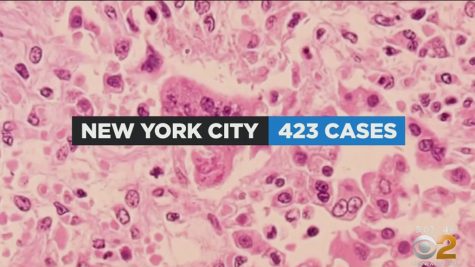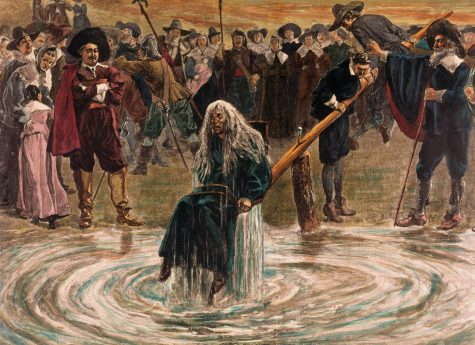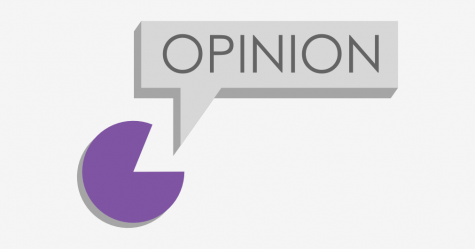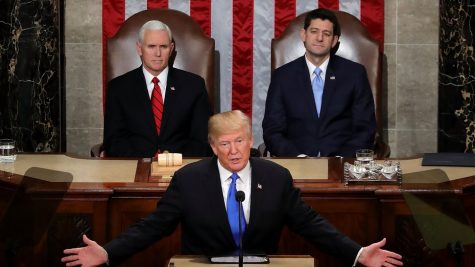November 2018 Elections: Making Way for the Blue Wave?
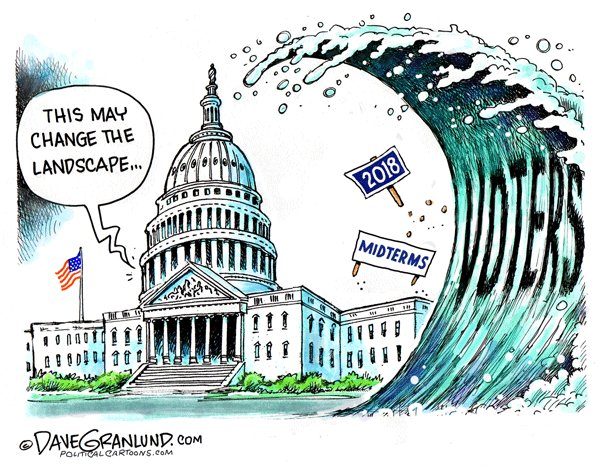
THE ELECTION
Tuesday, November 6, marks not only the gubernatorial elections in Vermont, but a potentially game-changing election for the U.S. on a national level. Not only are all 435 seats in the House of Representatives up for election, but there are also 39 governors across the 50 states and 35 of the 100 seats in the Senate (including Vermont’s Class I seat, incumbent Bernie Sanders (I) and challenger Lawrence Zupan (R), with their hats in the ring). For Democrats, this marks the opportunity to grab some seats in the GOP-dominated House and interrupt the current balance of power in Congress.
GOP MAJORITY UNDER TRUMP
Since 2012, the GOP has had control of both branches of Congress. During President Barack Obama’s second term, this meant that very few bills were passed, as the Republican party blocked any and all legislation the former president attempted to introduce. Since 2016, when Trump took office, GOP power has reached levels unparalleled, some say, since the 1920s, with the majority in the House, Senate, and Supreme Court. , Whether you hate him or love him, the fact remains that the first half of Trump’s term has been marked by very little resistance from any of the governing bodies. So far, Trump has rolled back countless Obama era initiatives, including regulations on greenhouse gas emissions; mandates on disallowing funding cuts to Planned Parenthood; laws that require educators to pass tests in order to be certified and establish a universal education curriculum; laws binding employers to keep records involving workplace injuries, protecting whistleblowers; and laws put in place that make it more difficult for mentally ill people to purchase guns. He has also passed laws that make it easier for companies to collect and sell personal information from the Internet and access phone records of foreigners without a warrant. This is in addition to a $700 billion military budget and the passage of the Tax Cuts and Jobs Act which drops corporate taxes from 35% to 21%,while the middle class only receives a 2% cut. Trump has moved forward with almost no resistance, particularly since Senator McCain’s passing in August, as he was one of the few Republicans to openly disagree with the President on key issues. From a judicial standpoint, a GOP majority has also meant that investigations into alleged election corruption, Trump’s refusal to impose serious sanctions on Russia, and the probe (if it can even be called that) into the Kavanaugh scandal, have been lacking to say the least.
This is not to say patterns like this are specific to the Trump administration, but for the moment under the GOP majority, Democrats have basically no say in what does and does not get passed on non-bipartisan bills. They are hoping to change this come November 6, in what is being known as the Blue Wave, or the expectation that the Democrats will take the majority of the House.
THE RACE FOR CONGRESS
Current projections (as of October 17, 2018) say that Democrats have an 83.6% chance of taking 234 seats, leaving the GOP with 201.This gives the Democrats significant sway in Congress that they currently lack. On the other hand, the Senate will likely stay in GOP hands. In order for the Democrats to break even in the Senate, they will have to win 27 of the 35 contested seats.Twenty-five of these seats are expected to go to the Democrats, but two seats, are tossups, with the Democrat candidate leading by a margin in Missouri and the Republican candidate leading by a margin in Nevada. The speculation is that this race will end with 48 Democrats and 52 Republicans in the Senate. Though some say it is possible for the parties to tie, analysts put this likelihood at 18.6%. Either way, this will mean that the Democrats will increase their current seats by 2.
THE GOVERNOR RACE
It may be hard to see how the race for governor has anything to do with the shift in power happening in D.C, but who takes these 39 states plays more of a role at the national level. In key states like Georgia, Kansas and New Mexico, the governor election will likely have a huge impact on immigration policies in the south, while the elections in Maine, Oregon, Ohio, and Florida, have more economic importance. These elections will likely affect Medicaid and jobs in those states. Although policies regarding these issues can only change on a state level, based on which governor is elected, dissatisfaction and support will have an overall impact on policies in D.C. Current analysts speculate that changes on immigration policies in Kansas and New Mexico will directly affect new legislation introduced in Congress in the next few years. Medicaid changes in Maine will put 70,000 people out of a job and raise the overall national unemployment rate, putting Trump’s re-election campaign in 2020 in jeopardy. At the same time, racist comments made by Trump backed candidates and incumbents in Maine and Georgia are expected to directly affect the President’s already dwindling approval rating if they win their respective elections. Unlike these elections, the South Dakota election could severely benefit Trump if U.S. Representative Kristi Noem were to win. As a member of Congress, Rep. Noem agreed with Trump on over 92% of the issues and is running for governor in a state where Trump is still the king in popularity.
GOP MAINTAINS CONTROL
In the unlikely event that the GOP remains in control, U.S. citizens will feel it more in their wallets than anywhere else. The Republican party considers the Tax Cuts and Jobs Act to be their greatest success this term. This bill has been good for businesses and corporations, but bad for general consumers and the middle class. It is also expected that they will attempt to push forward a bill that repeals Obamacare, leaving millions without health insurance. This also will require people to be employed or actively seeking jobs in order to apply for government assistance, such as food stamps. On a more serious note, continued GOP control will weaken ongoing investigations into Trump’s dubious relationship with Russia and key cabinet members accused of unethical behavior, especially after losing key Trump opponents in the party, including McCain and Corker.
DEMS TAKE THE HOUSE
If Democrats take the House, it is expected that the investigations into Trump will find real footing. So far, calls for investigations into impeachable scandals on Trump’s part, including racist, xenophobic, and sexist legislation, have been overlooked. Democratic control of at least one part of Congress means that the president’s infractions will no longer be ignored. Their control will also put a stop to his domestic agenda, (i.e. bills affecting taxes, jobs, healthcare, immigration, gun laws etc). Trump will still have free reign over waging war and foreign policy, as this is regulated by the Senate, but his national control will wane significantly. In his first 500 days in office, Trump signed 176 bills into law due to little opposition from Congress. With the Democrats in control of the House, it is likely that the second half of his first term will be less productive. If you like Trump, this could be a problem. If you don’t, then this is what you want, as presidents are usually remembered by how much they did, not how well they did.
GET OUT THERE AND VOTE
There you have it, the stakes are high this election so it is important that you get out there and cast your vote. The race is close enough that a single vote could be the difference between continued GOP dominance and a more bipartisan balance.
Below I have included links on how to vote in college. You may choose to register here in Vermont or cast an absentee ballot in your home state. Being away from home is no excuse to not vote; make your voice heard: get out there and vote!
How to vote in college:
https://www.bestcolleges.com/resources/voting-in-college/
Find your state’s absentee ballot policy:



